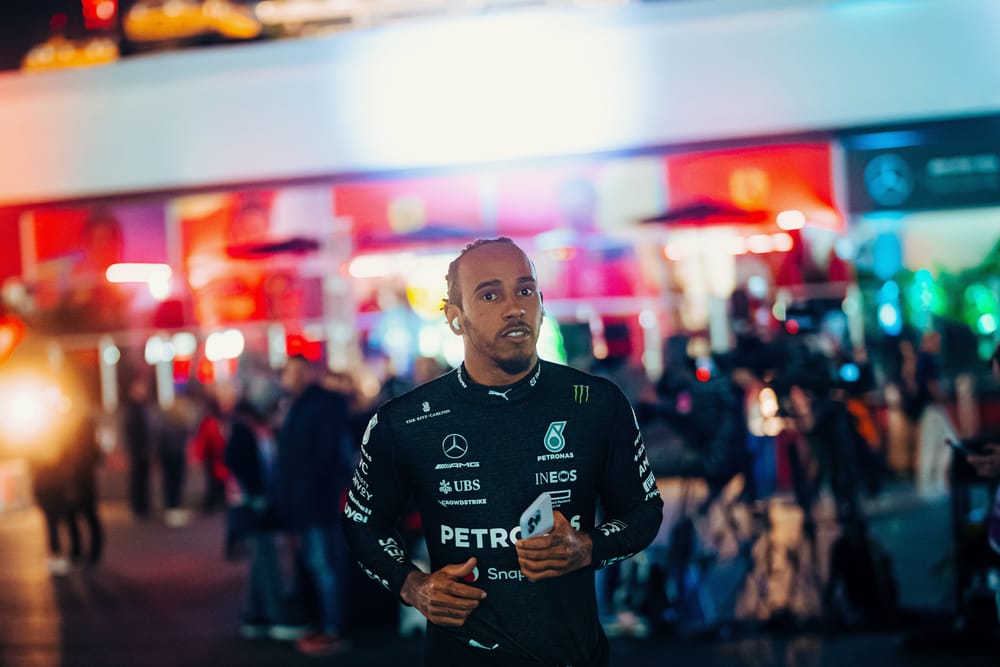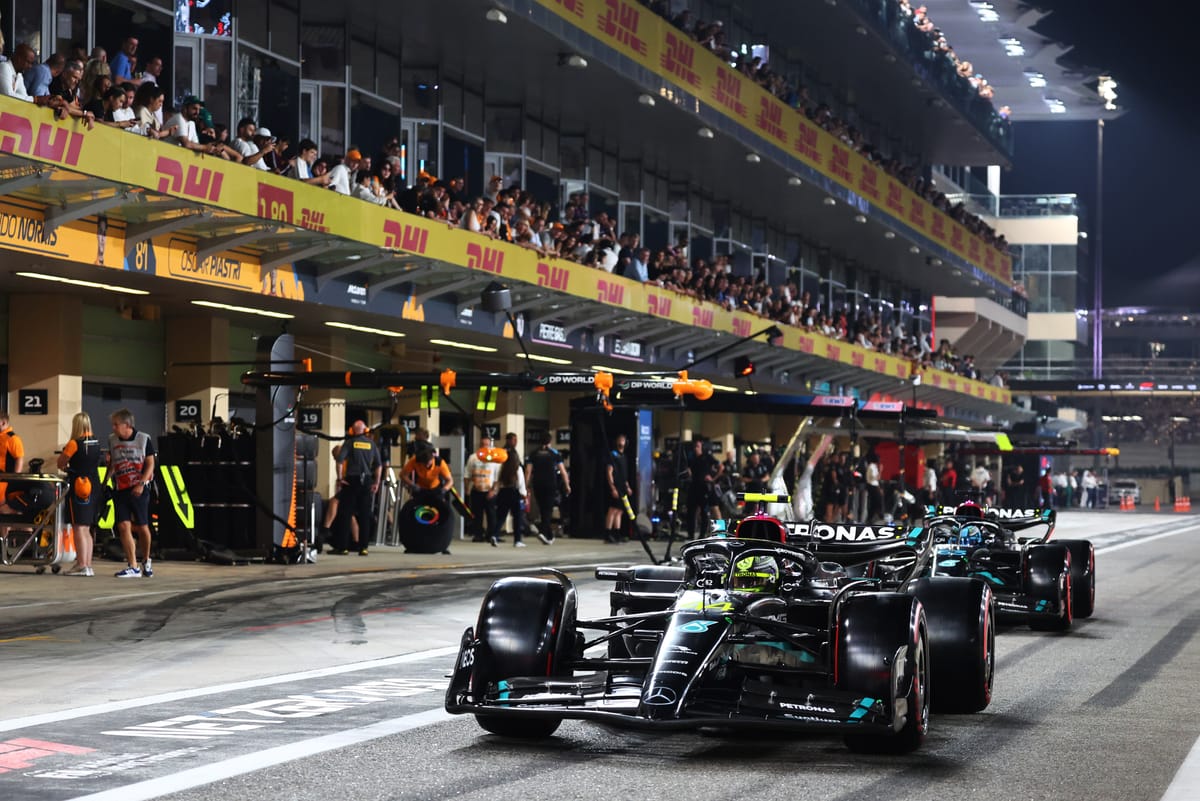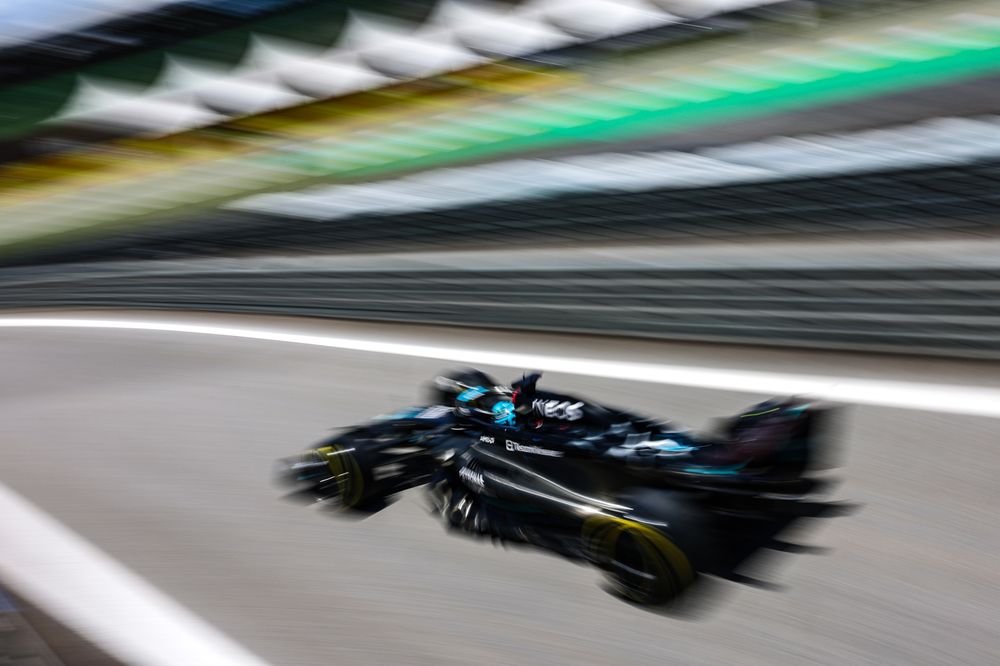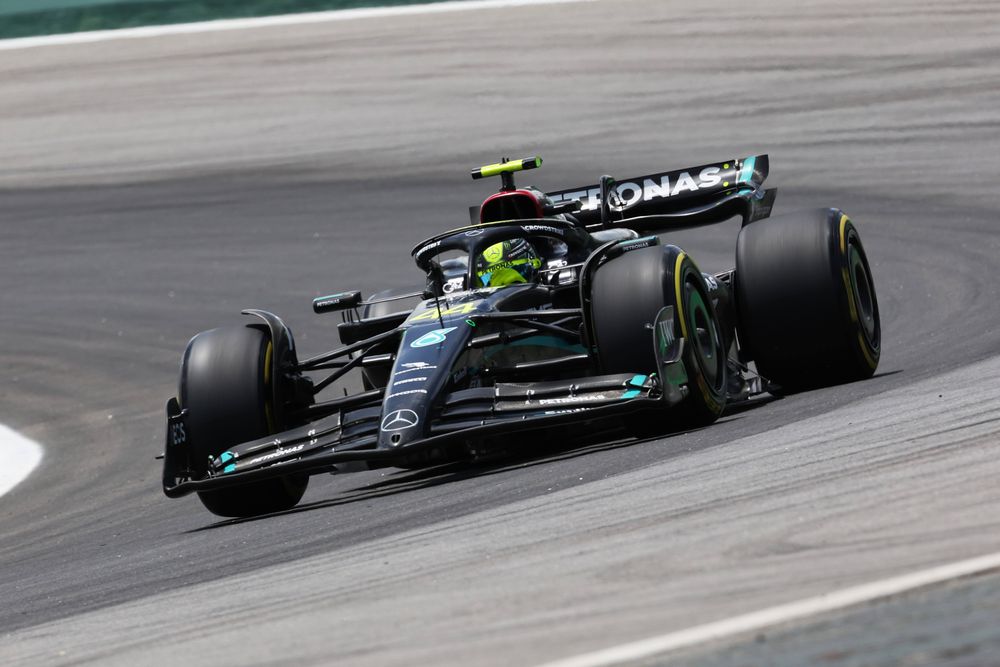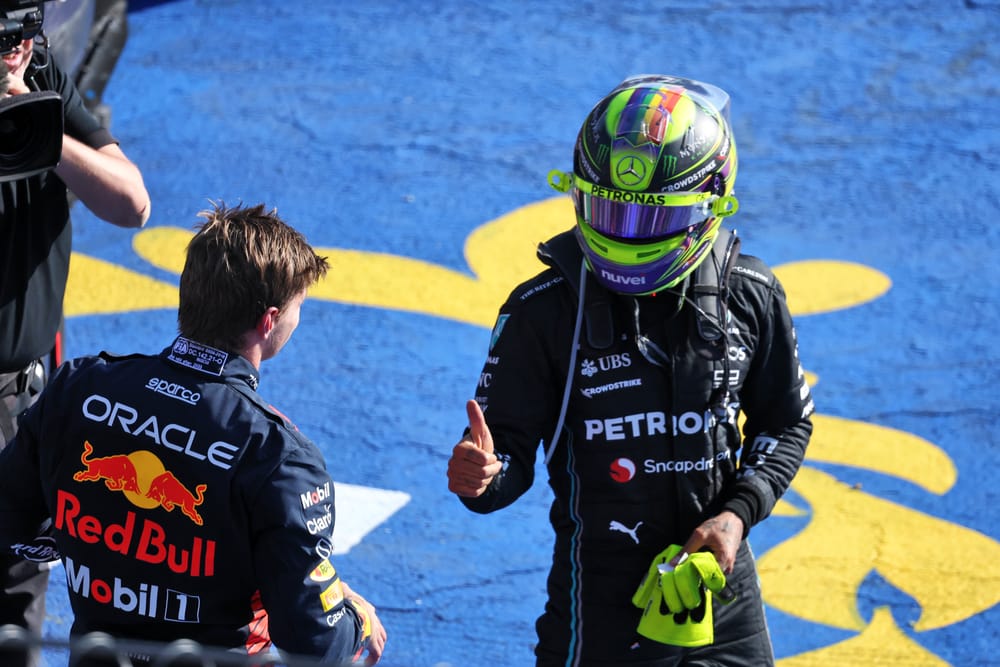Up Next

As our contributors continue to pick their highlights from The Race's 2023 content, Assistant Editor Josh Suttill singles out the candid interview with Lewis Hamilton that Mark Hughes was part of as the seven-time Formula 1 champion reflected on another year of Mercedes shortcomings that raised doubts of his own.
Mark Hughes's words are never wasted but this was an exceptionally beautifully-crafted piece of F1 journalistic poetry. Two titans of F1 both at the top of their game.
Hamilton gives some great insight into his mindset during another disappointing season but a great story is nothing without an equally great storyteller, and Mark manages to elevate it to the status of a historical reference that myself and others will be returning to time and time again in the future.
February of this year. Lewis Hamilton is sitting in the back of the Silverstone garage, deflated. It wasn’t supposed to be like this. Not this car.
This was going to be the corrected version of Mercedes’ initial attempt at a tunnelled ground effect machine.
Now that everyone had understood what had gone wrong in ’22, this was supposed to be the one with all the faults rectified.
The one that would bounce him right back into the limelight, the one in which he could take the fight to Red Bull and Max Verstappen. He’d had to contain his excitement at that.
Our favourite content of 2023 so far
And then he’d driven it.
“I remember being in the garage... just trying to think.
"I remember having bouncing still.
"I remember it feeling exactly the same, and definitely it was not a great feeling… the car had all these problems. So I just knew that it was going to be a long year.”
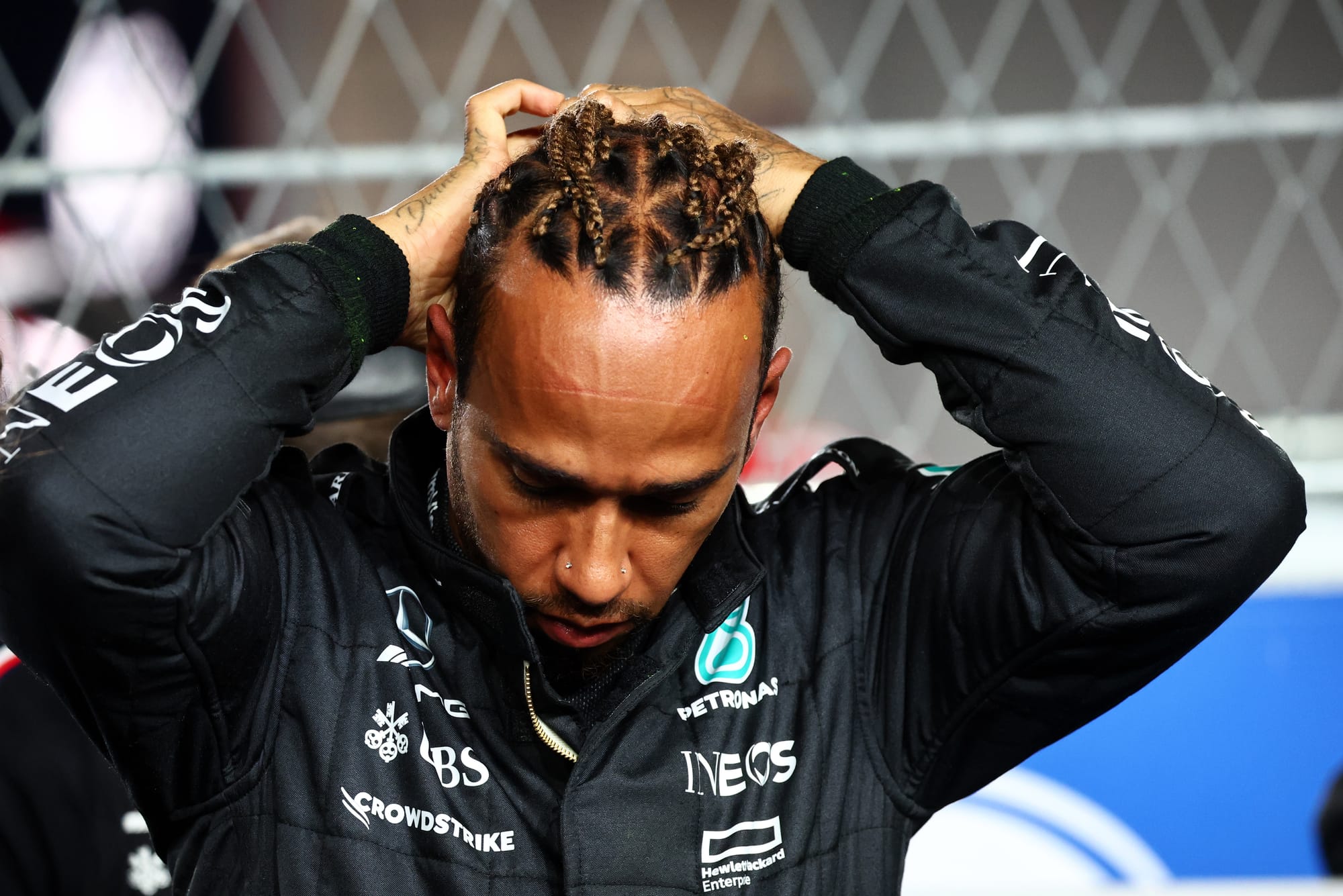
There aren’t all that many Formula 1 years left when you’re a driver in your late 30s. You can’t really afford long ones that just have to be endured.
For a team, the time cycles are bigger – and that was his worry. One which is still concerning him at the end of this winless season.
He’s not wired up to be an also-ran, and there’s a palpable sense of philosophical resignation emanating from him now.
Hamilton was a contender from his first day in F1 and spent 14 consecutive years in that role. Giving him mediocre cars in the late stages of his career was never going to sit well with him.
Forget comparisons with Fernando Alonso’s long wilderness years and how he was able to endure it. They are entirely different people, with very different F1 career paths.
Denied the oxygen of fighting for wins, he seems downbeat, slightly melancholy perhaps, reflective certainly.
It's as if he’s caught between how his competitor’s brain is telling him he should react - to dig deep, help instil confidence in the team around him, inspire like the champion he is – and how his emotional core is reacting to this novel situation and the call of what may lie beyond.
His story has made him, just as much as he’s made his story. It’s been an incredible ride - he’s been in F1 for over 40% of his life - and there are surely all sorts of complex emotions whirling around at this point, questions unanswered, new discoveries beckoning.
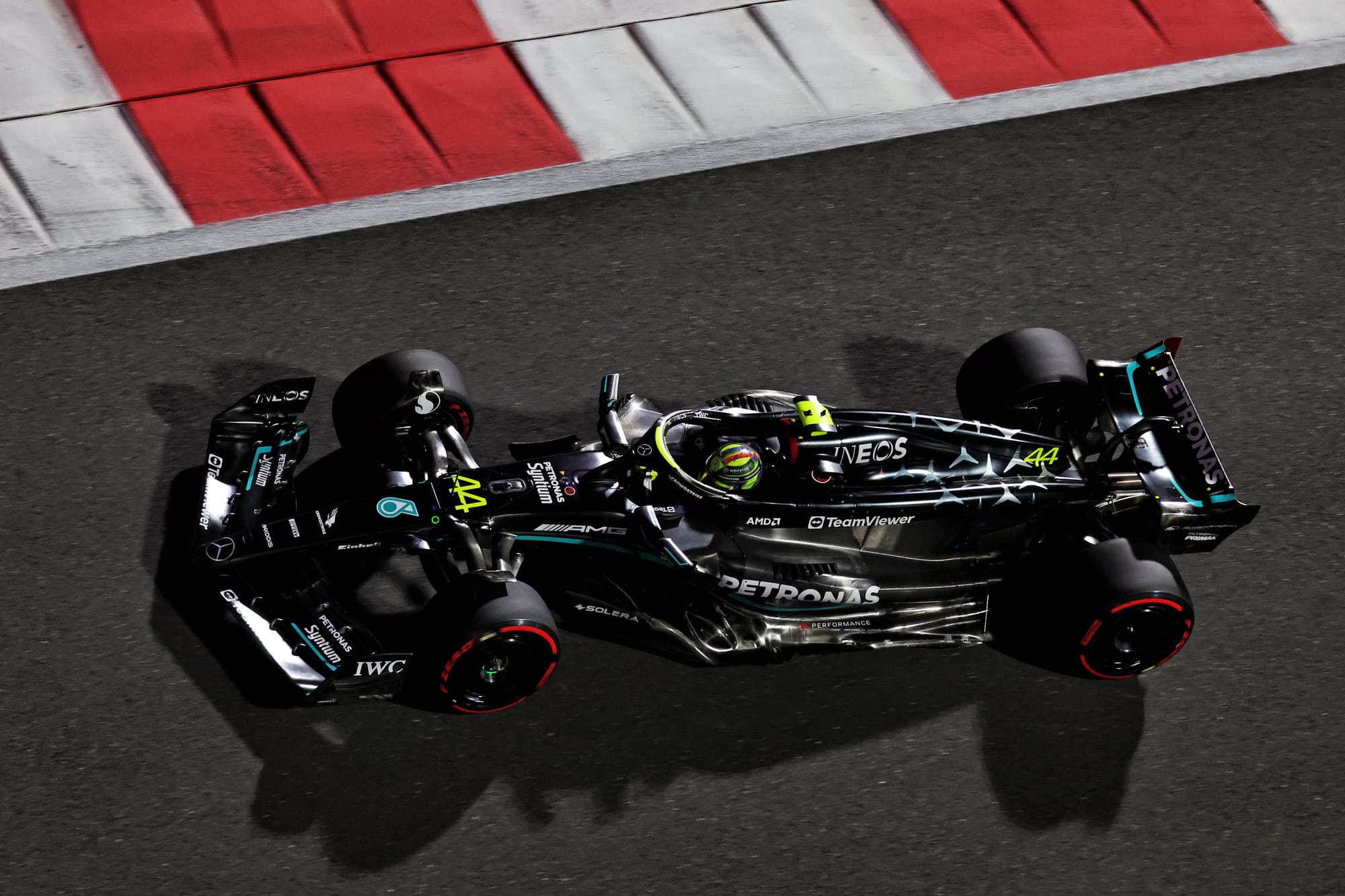
So even in this interview, during which he seemed relaxed, natural, friendly, there was an underlying sense of uncertainty.
There is conflict there. But there is also, still, a dream of glory and that surely retains a powerful hold, especially in what is generally recognised as the era of his successor, Verstappen.
How long can he hang on to that dream before it becomes too ephemeral, before too much time ticks by?
As he sat in the back of that Silverstone garage, knowing before the season had even started that the W14 was never going to be a Red Bull beater and that the return to the front was postponed for at least another year, his horizons were already readjusting.
He hadn’t been totally unprepared.
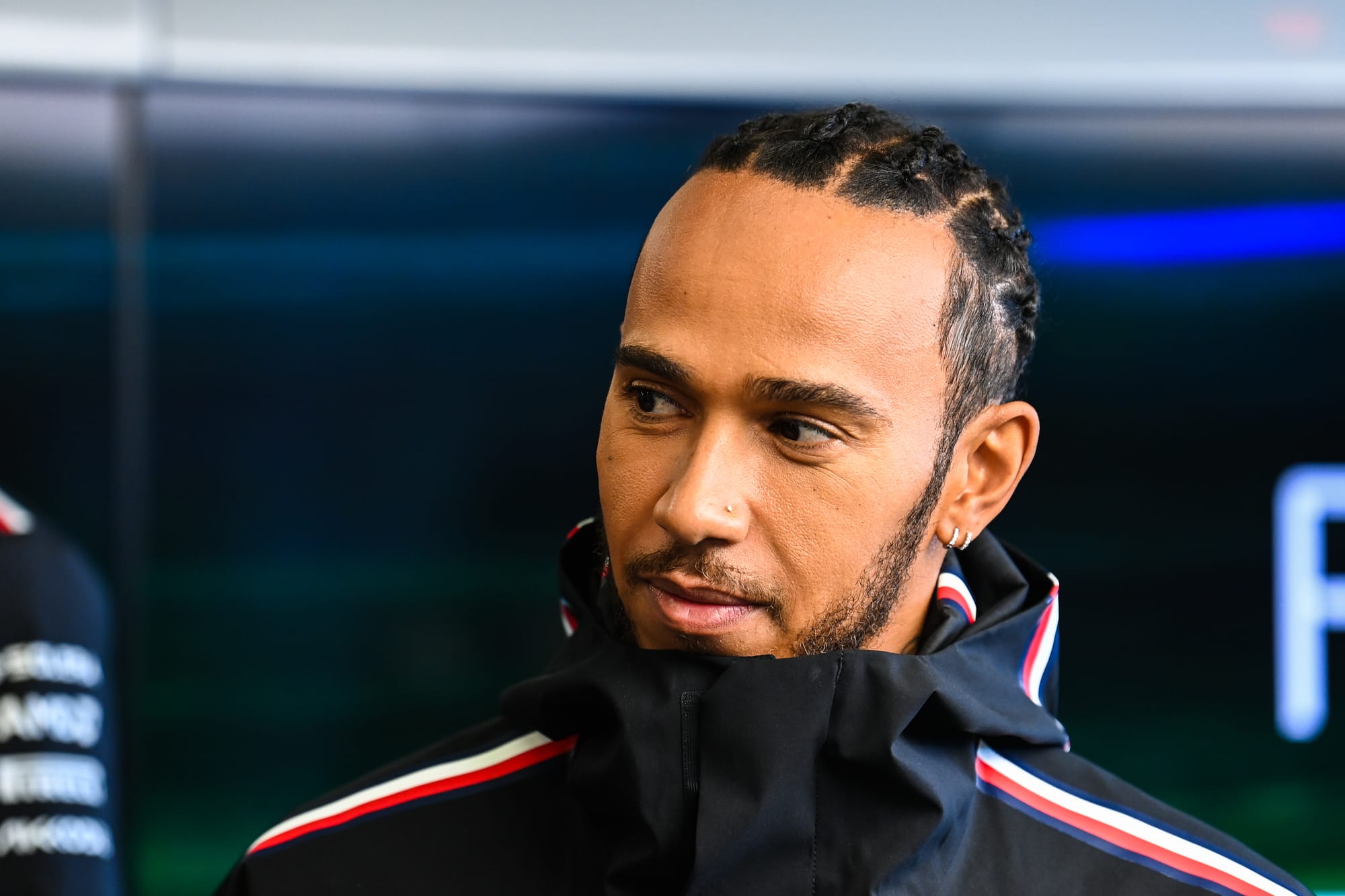
“I was a little bit more apprehensive in February compared to the previous year, because the previous year [I’d been told] the car is amazing, it's unique, no one's going to have anything like it.
"And then we got to the first test...
"So this time I was a little bit more cautious when I was listening, and I was like: we will see.”
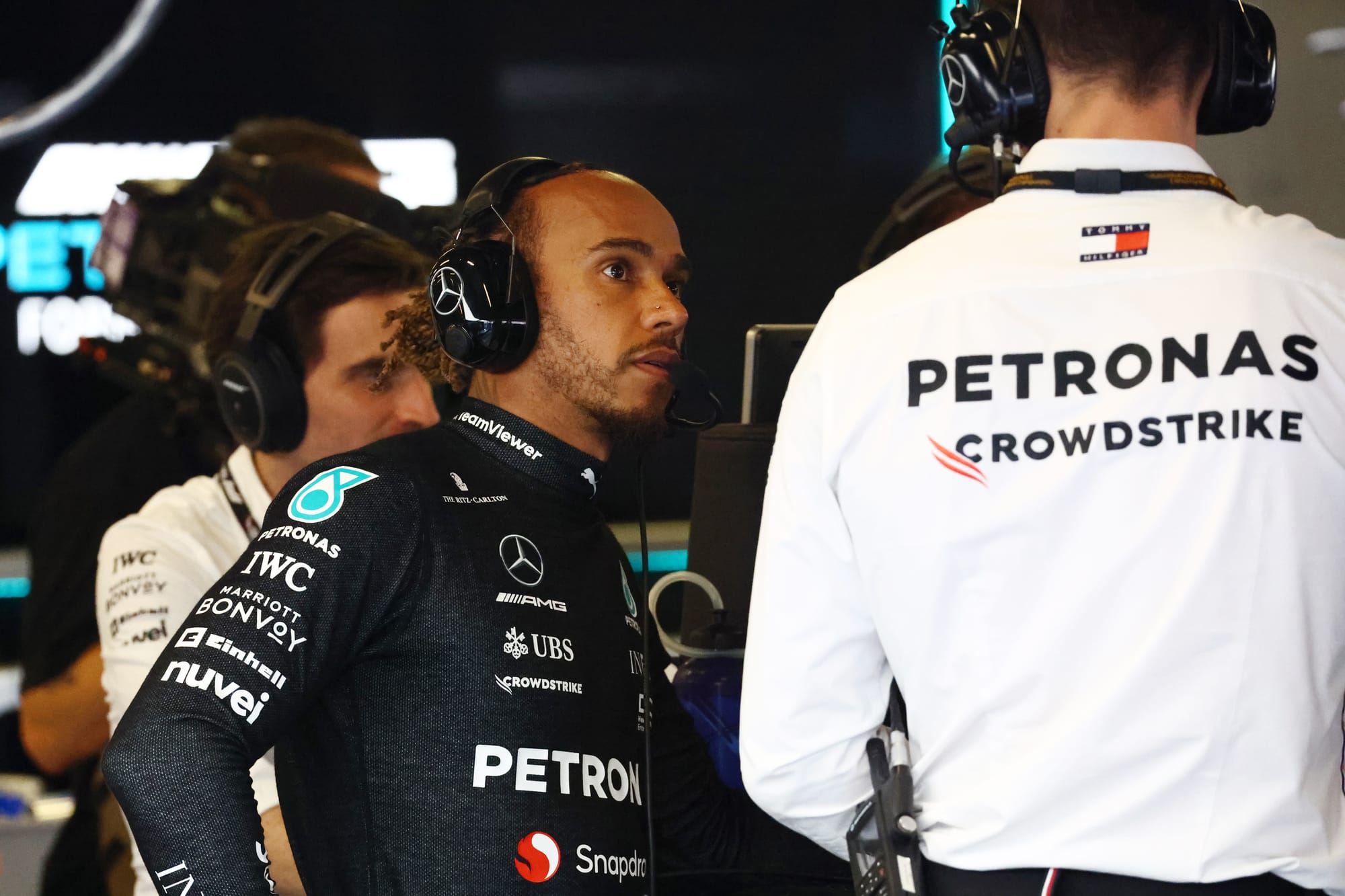
The misgivings he had at Silverstone were confirmed in the winter test days in Bahrain, where the car was around 0.7s off the pace. He didn’t hide his feelings when asked for his impressions of it.
“There were frustrations, because I had asked for certain changes and they clearly weren't done.
"But that's how it goes when you're working. Everyone's emotions are high. And everyone was still working so hard but it’s just not coming to us.
"So it gets frustrating at some points, but then you have just got to channel that energy towards working. There's nothing you can do except work towards trying to improve it.”
That is the slog – and you either buy into it or you stop.
“Luckily, I had a lot of experience of it in life. So, I was able to channel that pretty well.”
So off he set on another uphill battle of a season, eventually finishing third in the championship. There were a handful of second places and a few highlights, including the pole in Hungary and the chase of Verstappen at Austin.
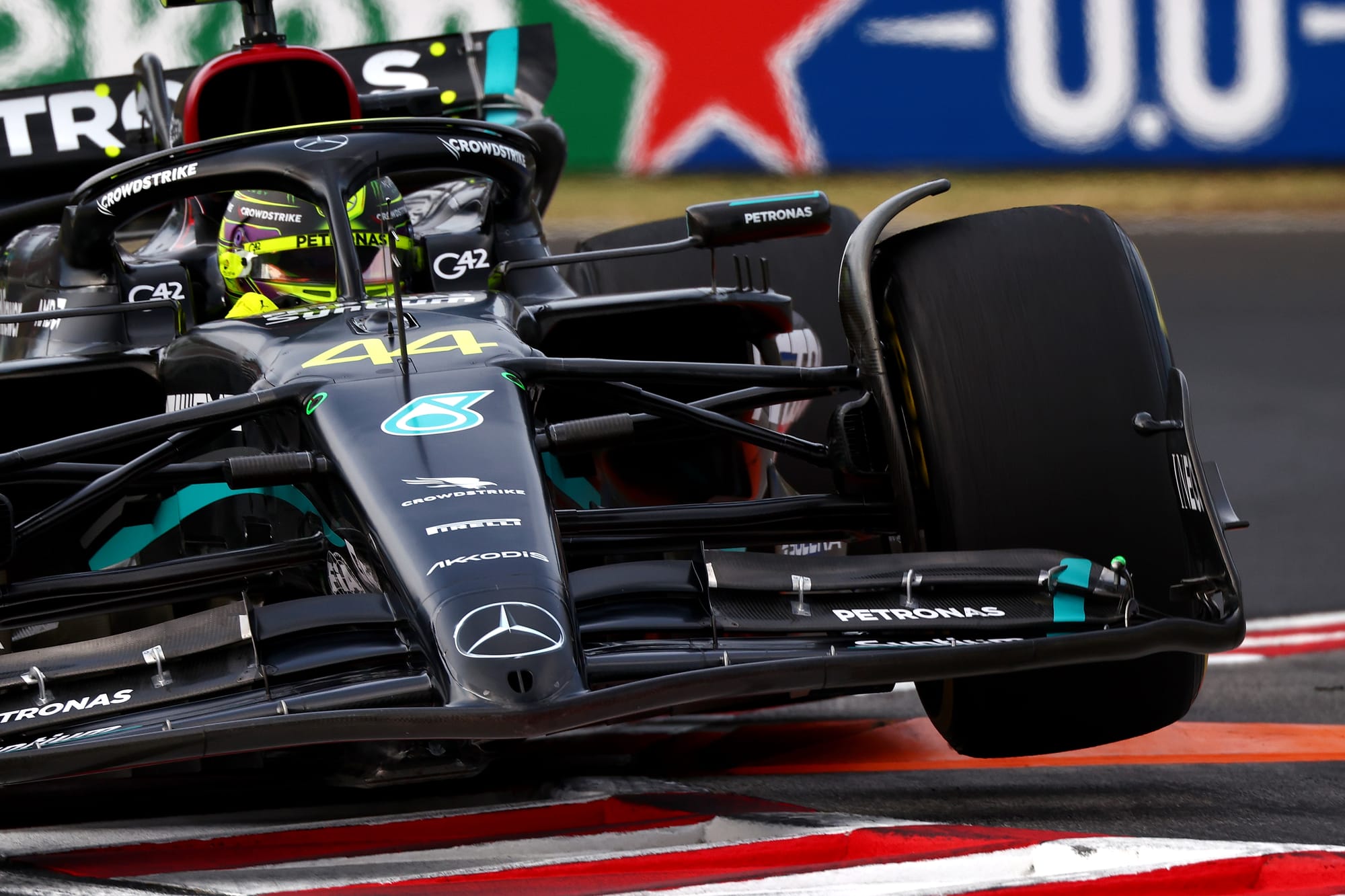
That Budapest pole especially was important. It represented a brief window where the car dovetailed with what Hamilton needed as a driver to access the special stuff.
If a car doesn’t allow a driver to deploy the extra dimension of their skill, it will set a false ceiling. Just as with Verstappen in the early part of ’22 when the Red Bull’s understeer made Sergio Perez – a decent driver but not in the same league – uncomfortably competitive with him.
The corner speed range of Budapest allowed the W14 to be set up in a way that made for a decent facsimile of Mercedes' past.
An admiring Nico Rosberg commented of Hamilton’s lap – 0.003s faster than Verstappen’s - “I’ve witnessed many of the special moments he used to have and that was one of those. That lap was perfection, it was an art.
"Only Lewis Hamilton could do that on such days. No one could have gone a hundredth faster.”
Verstappen spoke afterwards about how he didn’t have his usual confidence in the Red Bull, that the front axle wasn’t giving him the messages he needed.
Access to the outer reaches of his ability was denied him. Which of course is where Hamilton has been languishing for much of the last two seasons.
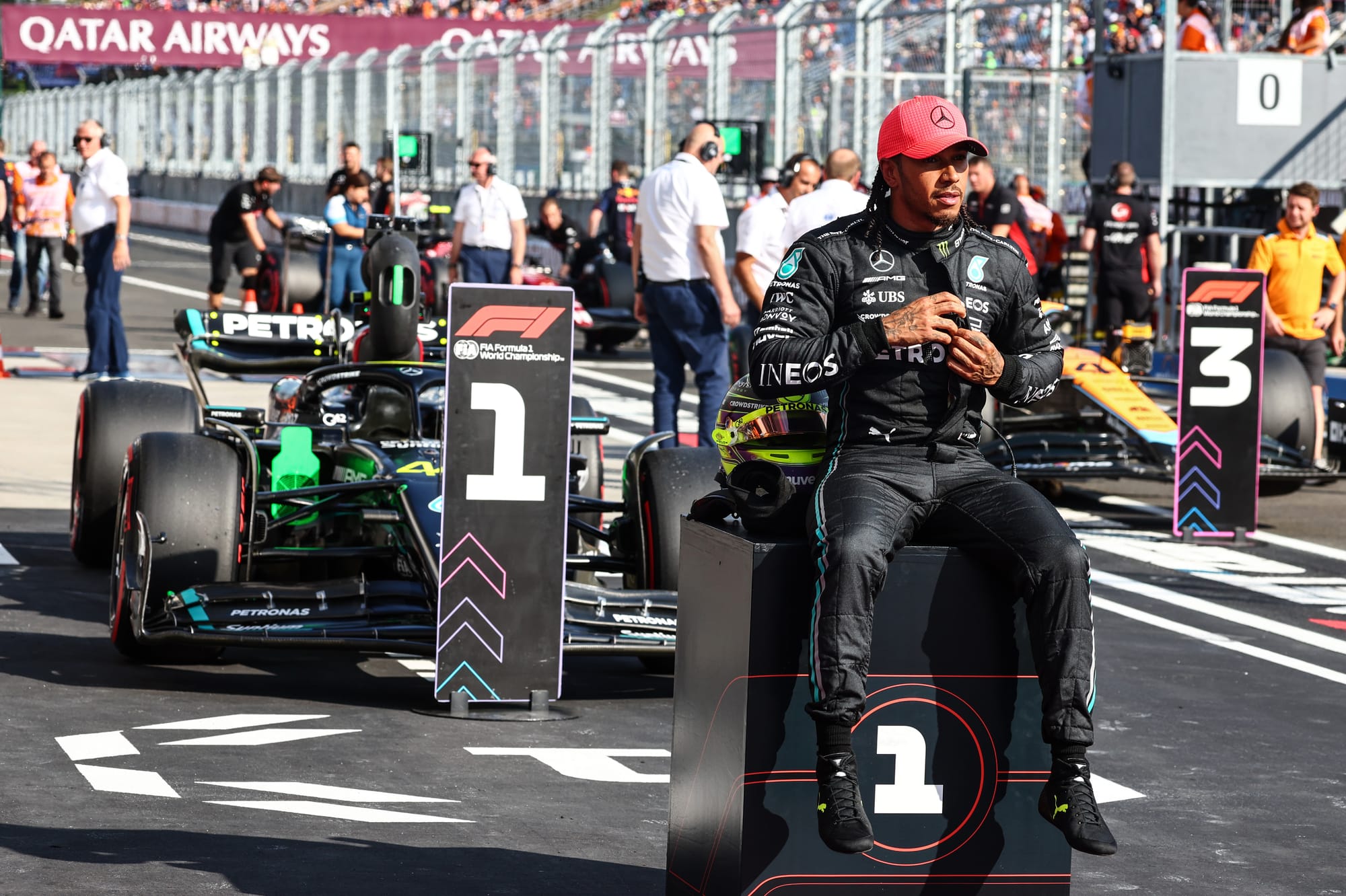
Going for such extended periods without experiencing that special harmony between driver and car can lead to inner questions – and Hamilton is not immune.
“There are always going to be moments when you’re like, ‘Is it me or is it the car?’.
"Do you still have it? Has it gone? Because you’re missing that… when the magic happens, when everything comes together, the car and you and you get that spark, it’s extraordinary, and that’s what you’re in the search for.
"Of course [I had these moments of doubt]; I’m only human. If anyone in the world tells you they don’t have those things they’re in denial. We’re all human beings.”
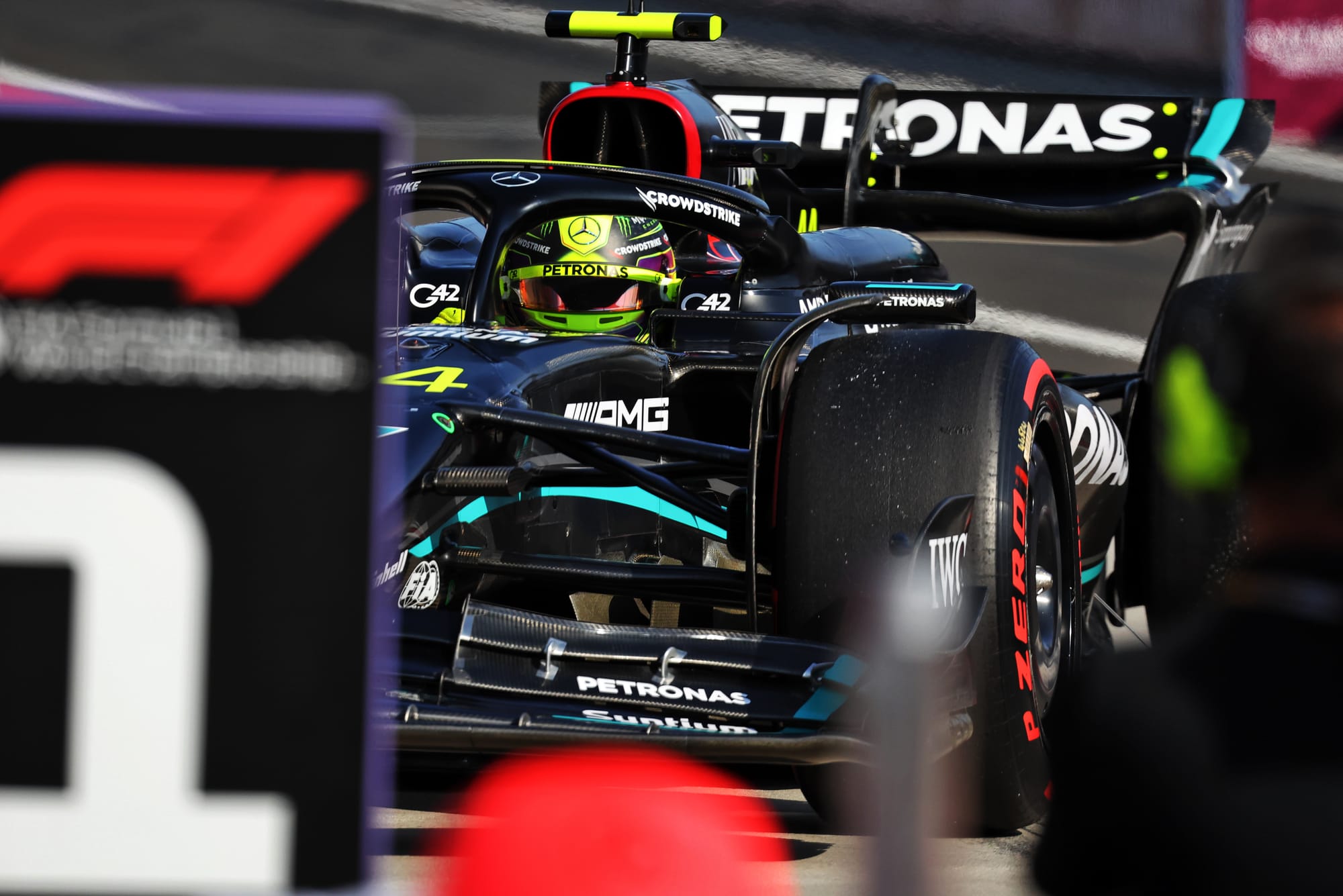
F1 is a breeding ground for such doubt, the waters forever muddied by the crucial variable of the car’s performance.
It’s difficult to know how he might react to a third consecutive season in an uncompetitive car at this stage in his career.
Although he says all the right things, sometimes his expressions betray a reality that’s possibly different.
“My racecraft and race pace I have been really happy with through the year, not a lot of mistakes, most of my race performances have been really good.
"So that level I am happy with, building that up to the level it should be. But qualifying is still an area that needs to be improved.
“We struggle as a team getting the performance out of these tyres and you’ll notice there [will be] one weekend where George [Russell] will be massively off and I’ll be OK and then it switches the other way.
"And those are down to small details with our car. So we need to work better as a team to be able to extract it more consistently, as some of the others do.
"Generally, I have been much happier with my performance this year than last year.”
Much of that is down to the fact that the limitations of the car have played out slightly differently this year.
The regulation increase in floor edge and diffuser height – imposed to make cars less prone to bouncing – led the team to be over-conservative in the ride height at which it pitched its aerodynamic map, fearful of a repetition of last year.
“We had a lot of aero on that first car last year which we couldn’t use,” he explains.
"We had to basically knock a ton of downforce off it [for this year] and then slowly tried to add, but every time we tried to add, it was worse.
"So we just didn't improve for a long, long, long time.”
This time, he didn’t repeat the wildly experimental set-ups he’d tried in practice in the first part of ’22. He was no longer searching for a lightning bolt which was going to somehow transform the car.
“Yes because ultimately, it's really just about car characteristics," he adds.
"And you could change 100 things, but it doesn't really change the fact that the aero package is wrong.
"Sometimes it's in the window, a lot of the time it's out the window and no matter what car set-up changes you make, whether it's mechanical, roll stiffness, all those sorts of different things, you can't overpower the aero characteristics and through-corner balance.
"There were just certain things, decisions that had been made that just left you blocked at the end of a road, and you can't do anything, because of the cost cap and all these different things.
“At this point of the year the debrief gets boring.
"My engineers will ask how do you think the car is going to be and every weekend you are hopeful that it's going to be good. But it’s pretty much the same each time, it's under your expectations and your hopes.
"So, then you come in with a lower expectation and just build up to, commit to, what it needs to be.
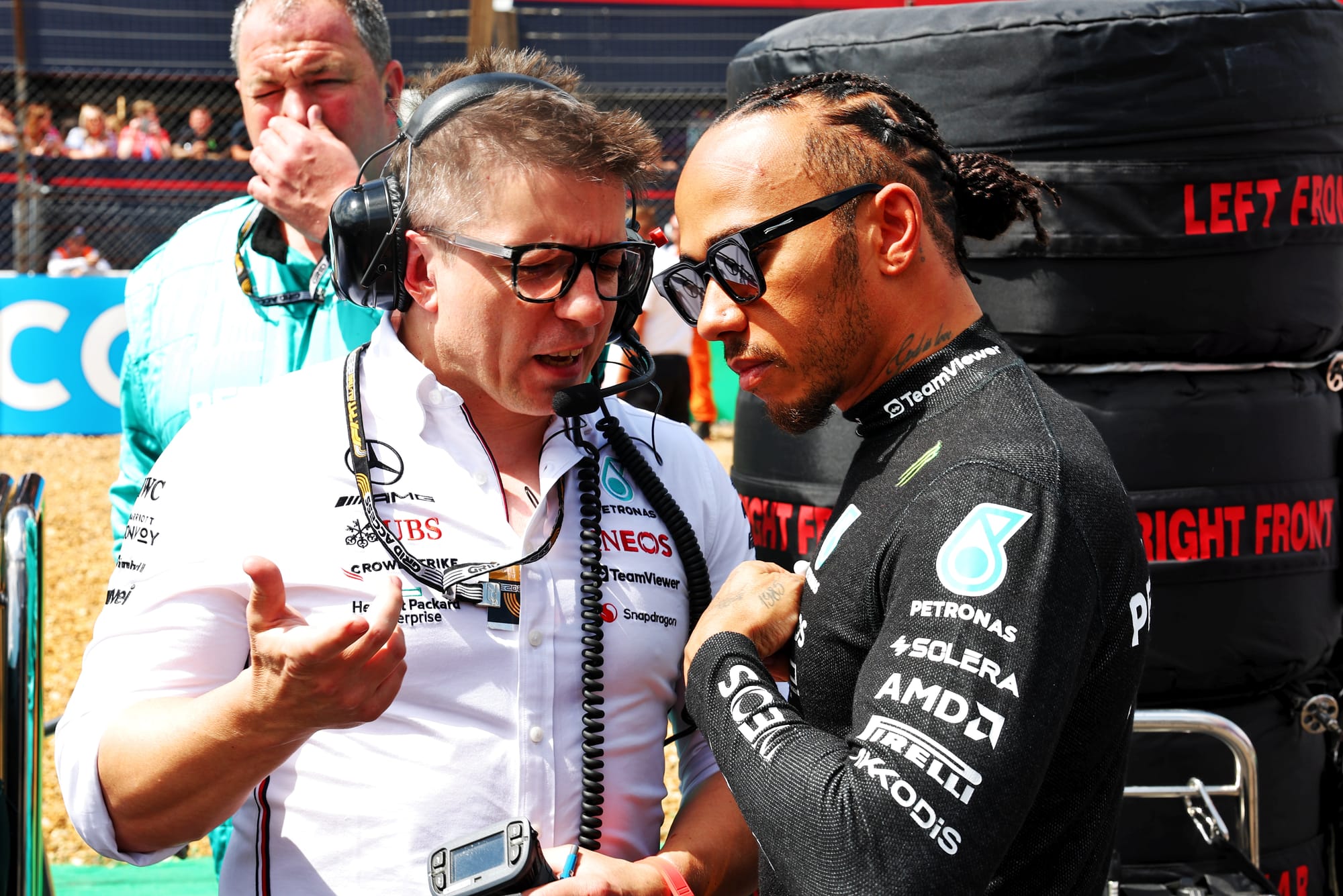
"But you still have a feeling of the car, just as ever before; we have these characteristics and you can't change it until the car's new in the next year.
“Red Bull have done an amazing job under these regulations. In Bahrain testing last year, they had a bouncing issue and fixed it that week.
"So if you imagine it’s as if you're trying to build a wall; with them it was one brick after the other, brick, brick, brick, just development, development, development.
"For us, we had to knock down the wall.”
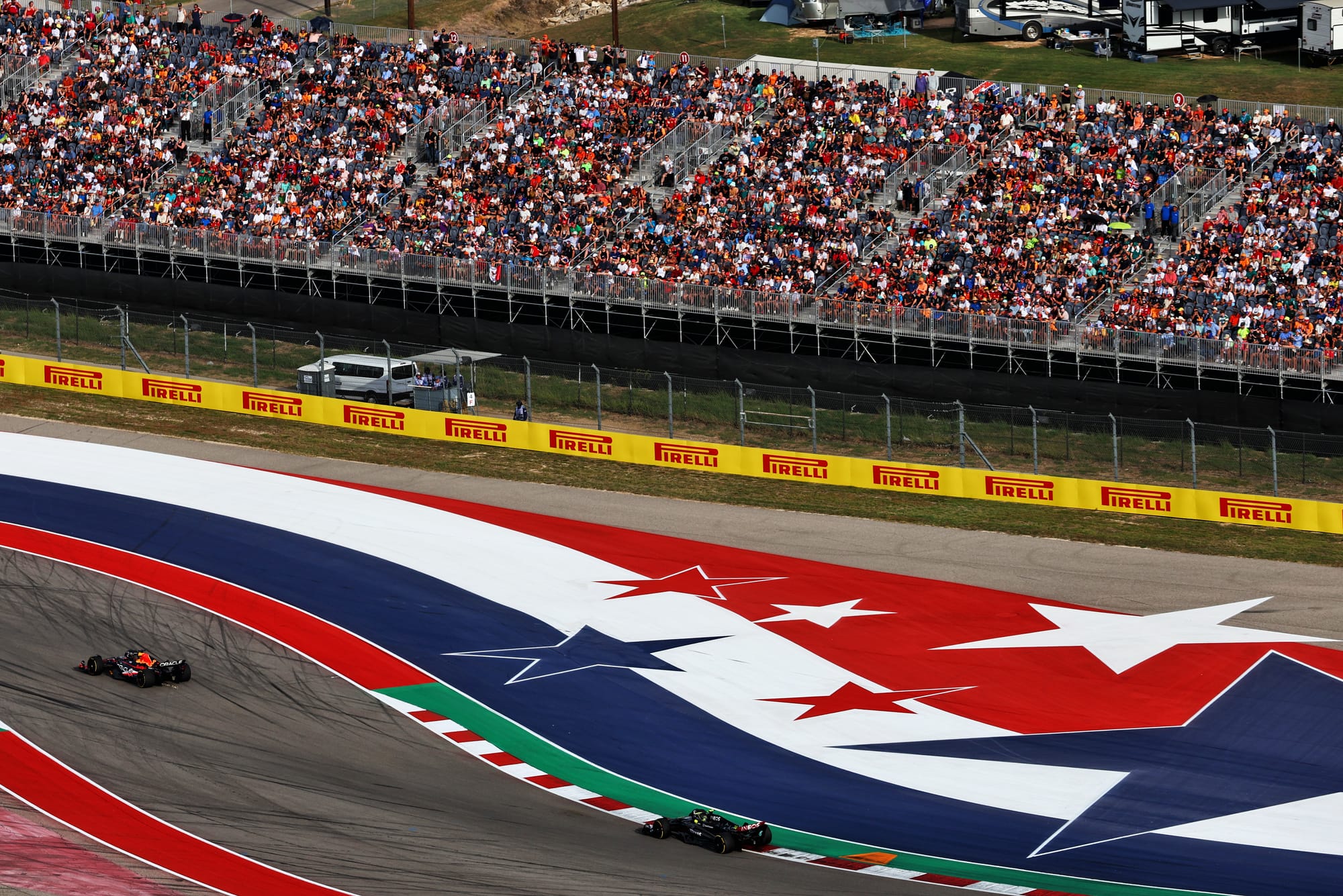
Sometimes he’d get behind Verstappen and what he saw had a familiar look.
“You watch the Red Bull and it does everything well. It looks very similar to my 2020 car, characteristic-wise. Super-stable. They are firing on all cylinders.
"It looks like it’s in that kind of window, like we used to have, which for a driver is a dream because then you can really extract your own personal abilities to the max.
“I don’t think we have ever really truly pushed them… maybe Austin we were the closest but even then I think they still always had a tenth or two on us at the bare minimum.
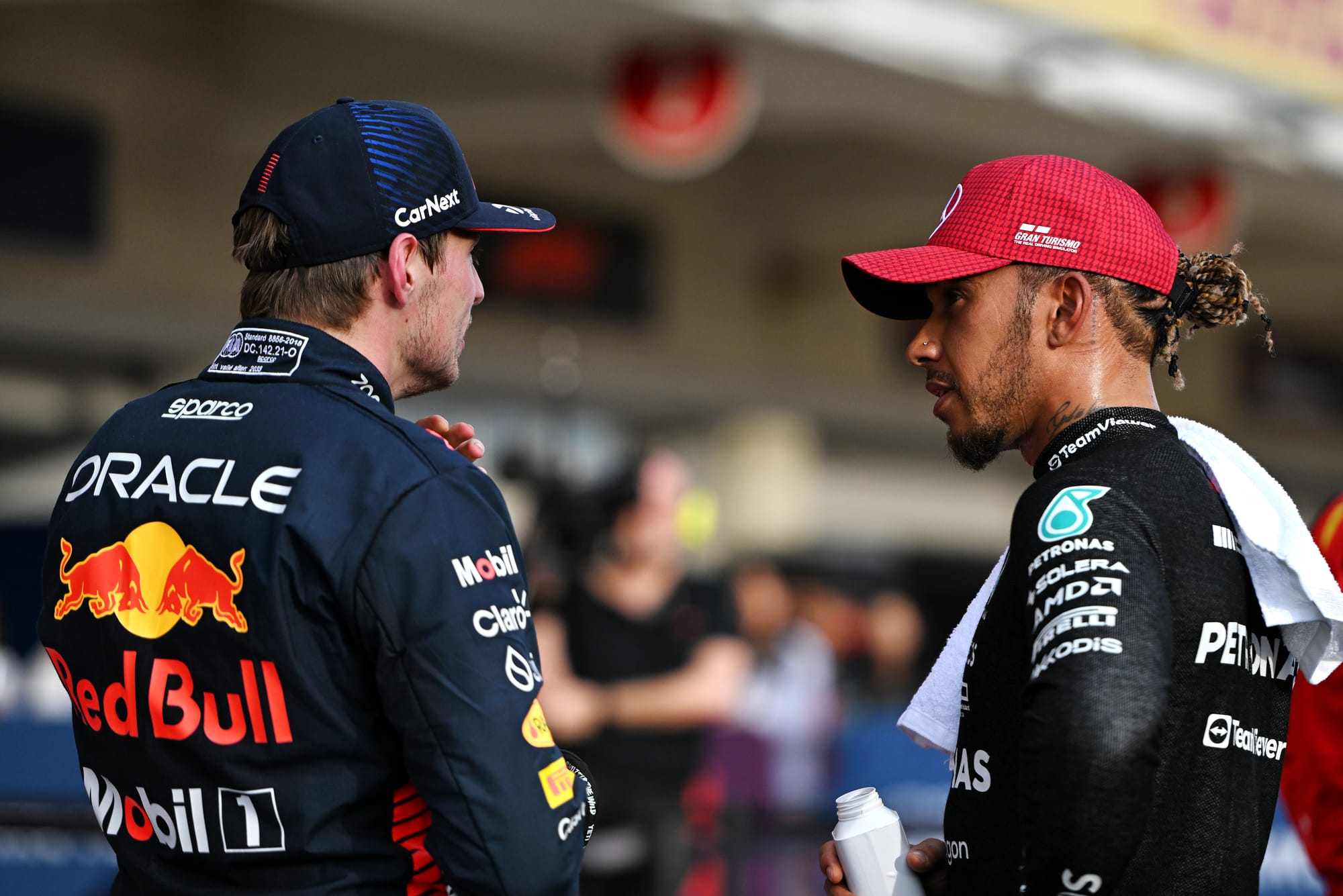
"You go through lap times and some of the data from Max, and you can see he is chilling at the front more often than not.
"I don’t think he has broken a sweat during the year.
"I think he was just able to control it and when you are in that position when you have performance and can back off, the tyres go longer and you are in a sweet spot and it’s amazing to be in that place.”
All of which begs the question of whether the team now understands how it got here.
It’s already confirmed that next year’s car will not be based upon the W13/14 concept. But that doesn’t necessarily mean it’s going to hit the ground running as a Red Bull challenger.
“I think we have understood the car so much better,” he says cautiously.
“We have developed great tools in the background. So naturally, I'm hopeful, but I'm not going to hold my breath.
“The thing is with the timeline you have and the limited resources you have, you can’t just throw it away and start from scratch, you can’t copy a car and start from that.
"Look at the Astons, they tried to copy a car and it wasn’t the same. It is not as easy as that, you have to try and take the good parts and through trial and error just try to add other parts.
“But you can imagine they are also nervous of making too big a change and it being the wrong one.
"We need to be consistently week-on-week adding performance and we have higher targets than ever before because we have a massive gap to catch. That makes it really tricky.
“I do have faith that we will get there, we have been [at the top] before as a team, and while we have more and more new people, we still have great values and I see great focus within everyone.
"It’s just having really good conversations with everyone back at the factory that they actually make the changes and make the right decisions, and that so easily can go the wrong way.
“I think for this year they thought the fundamentals were good and we just had to do this, this and this - and it was not the case.
"That’s why I was frustrated in February, because they hadn’t made the changes I’d asked for. With the changes we are making now, I hope we are right.
"But I guess we have no idea what the Red Bulls are going to do.”
At least this struggle has given a certain clarity to his task.
He’s faced uncertainty before – when he switched from McLaren to the ostensibly less competitive Mercedes team at the end of 2012.
But it’s a different process this time, and it’s not infused with the same thrill.
“When I moved, there was an excitement.
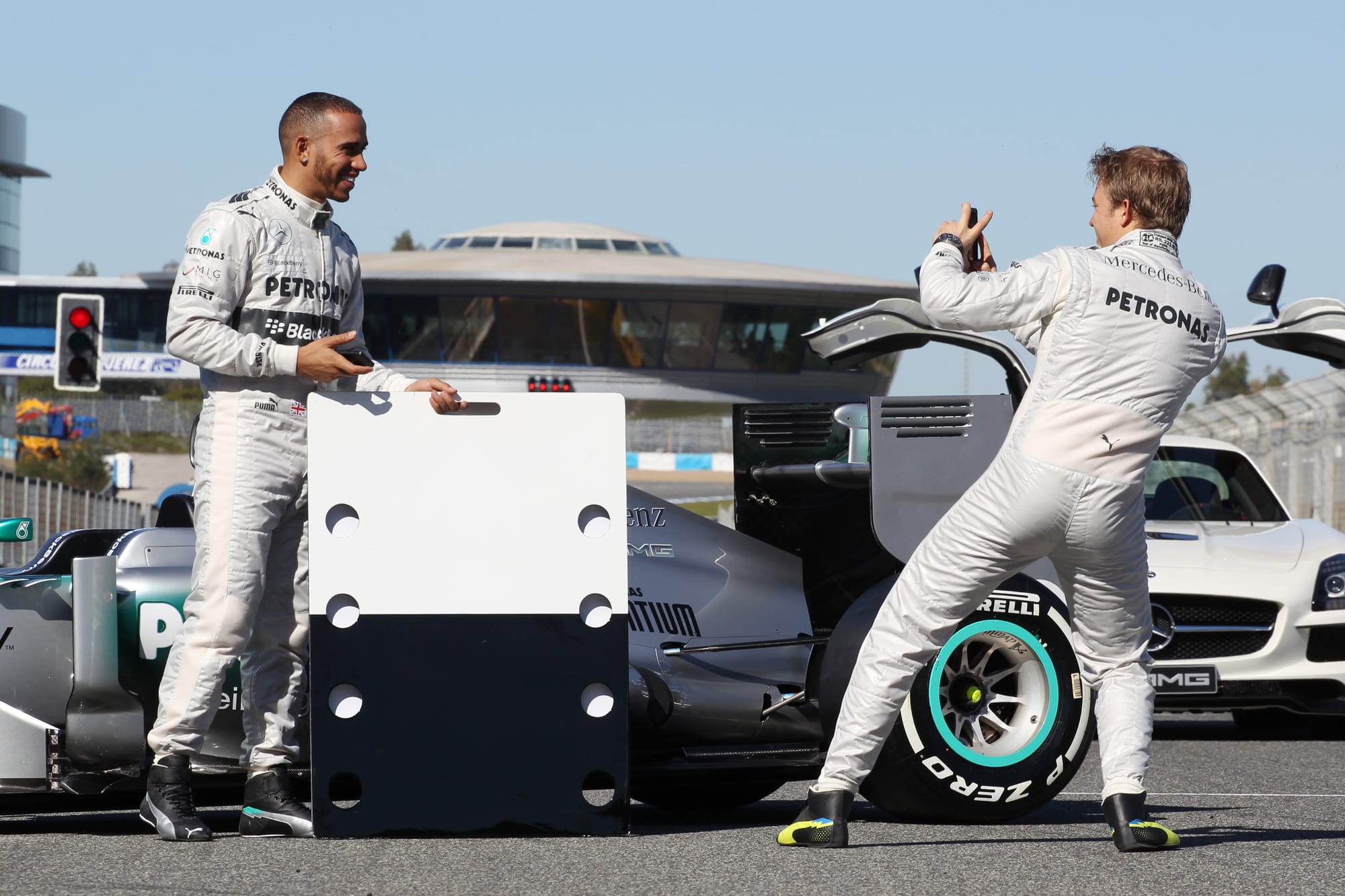
"We expected it to be difficult to start off with because they hadn’t had a lot of success so there was just raw excitement, a new person on the team, getting into the nitty-gritty with everyone and building relationships.
"That was a different kind of excitement. This time we have known each other for years and we have great relationships throughout.”
There is not the same dynamic energy to help with this task. Which, 16 years into his F1 career, with all that immense achievement behind him, surely makes it more difficult to stay motivated.
Five years ago, he said he didn’t intend to still be racing when he was 40.
But then came Abu Dhabi ’21 and the loss of the eighth title. The way that happened was devastating to him.
It’s only natural to wonder about the psychological effect of this being followed by two years of mediocre machinery. He admits he considered retirement in the ’21-22 off-season.
“For sure, yeah. There was so much going through my mind during that period in time.
"But one of the worst things you can do is make decisions based on emotions and when you are emotional and in the heat of that moment, more often than not, you’re not going to make the best decisions.
"Emotions were high, it was a really, really difficult period of time, so I had to just wait until things calmed down, that I was clear in my thought and I was able to then make the right decisions.”
Did he seek advice at the time? The proud warrior in Hamilton fires back. “I really don’t take guidance from anyone.
"I was around my niece and nephew and was in a beautiful place, in Hawaii with my family and at a point where I just felt really content and felt I just wanted to get up again and keep going.”
Had Abu Dhabi ’21 played differently, maybe he wouldn’t have been racing into his ‘40s. But a few months ago, he signed a contract that will take him to the eve of his 41st birthday.
“Yeah it’s true. I think what you get to learn is you should never say never but at that point I definitely didn’t think I’d be continuing.
"They are long seasons. It’s a long time away from everyone and I’ve been doing it 16 years.
"It’s gruelling.
"There’s lots of glitz and glamour and a lot that’s positive, but it’s by no means freaking easy to stay at your best, to stay committed, to keep up the training, to continue to deliver constantly.
"It’s a lot of pressure, being scrutinised all the time, and I’m in a place in my life where there’s no way I can win.
"If I win a race it’s, ‘Oh he’s a seven-time world champion, with 103 wins’. If I don’t do well it’s [a big deal].
"I can only lose at this point in life and for sure there was a point when I was questioning whether or not I wanted to go through that.”
There it is again. That slightly despairing air, as if he can’t quite keep the mask in place.
He’s a complex character, as you’d expect of someone with his back story. An innocent in some ways and naturally sincere and open, but with a competitive fierceness which can override those natural traits.
He’s also mentally super-resilient and can bounce back in an unstoppable way to setbacks.
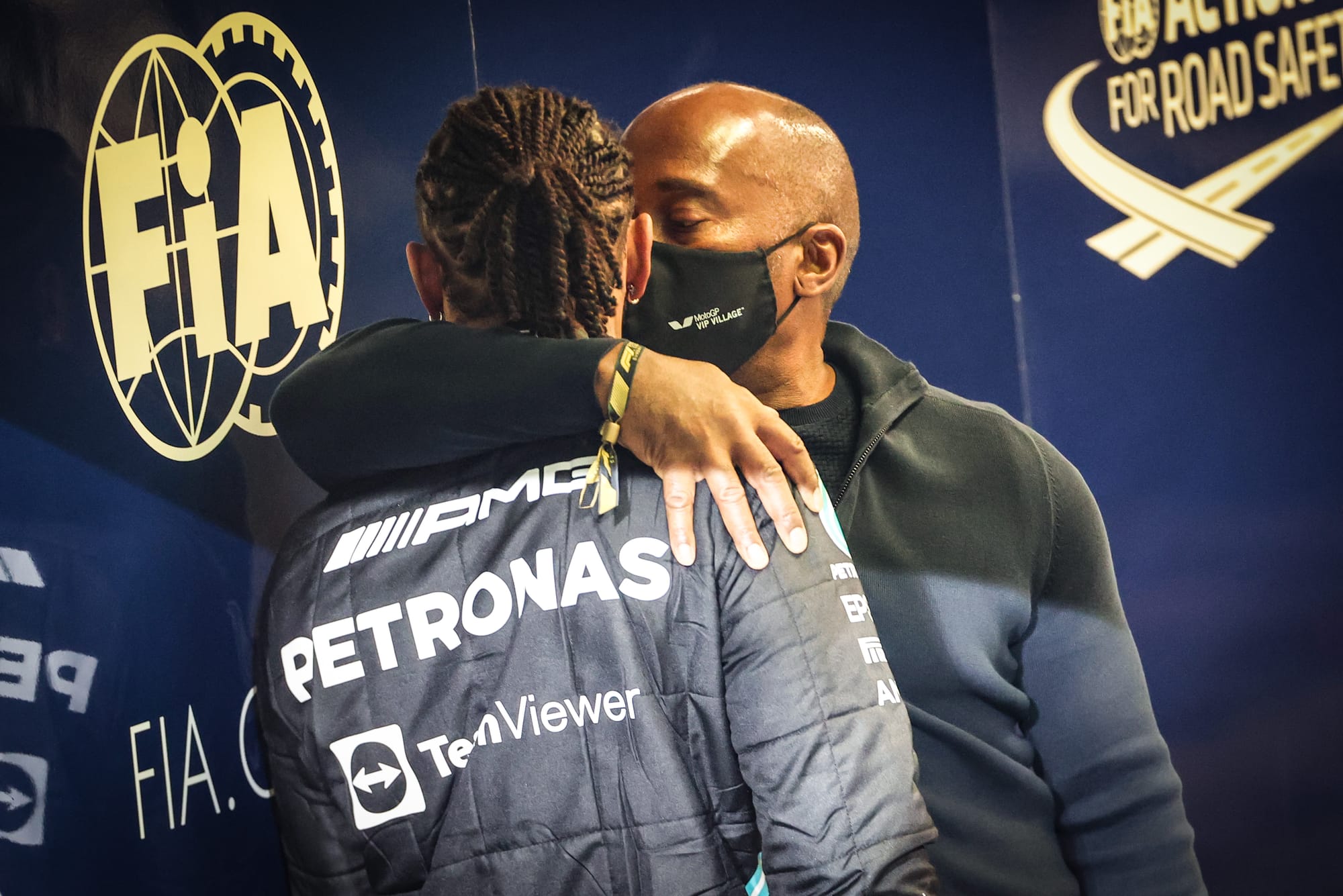
He knows what it takes to succeed; it’s been instilled in him since childhood and he’s embraced it.
So the competitor in him knows what he needs to do and say. But sometimes he will let the sincere, open part of him be in the driving seat.
It’s never been more noticeable than in his current uncertain situation.
Plug him into a fast car and he would surely be re-energised into the monster performer we all know so well. And perhaps that’s where the claims made by Red Bull’s Christian Horner about Lewis’ father Anthony having contacted him early this year have a ring of authenticity.
But what if the fast car doesn’t come to him? How long will he wait? He’s asked himself those questions and he continues to do so. Then he’ll try to banish the doubts and regroup.
“I try not to look at all that surrounds [those questions] and take the little wins, little gains you can make with the team, getting second in the constructors' championship with the team, how much that means to people in the team, learning more about how that affects their family life, how that affects being able to pay [their] mortgage, or paying for [their] kids to go to school.
"That’s something to be really proud of and from the outside world, people maybe don’t understand it.
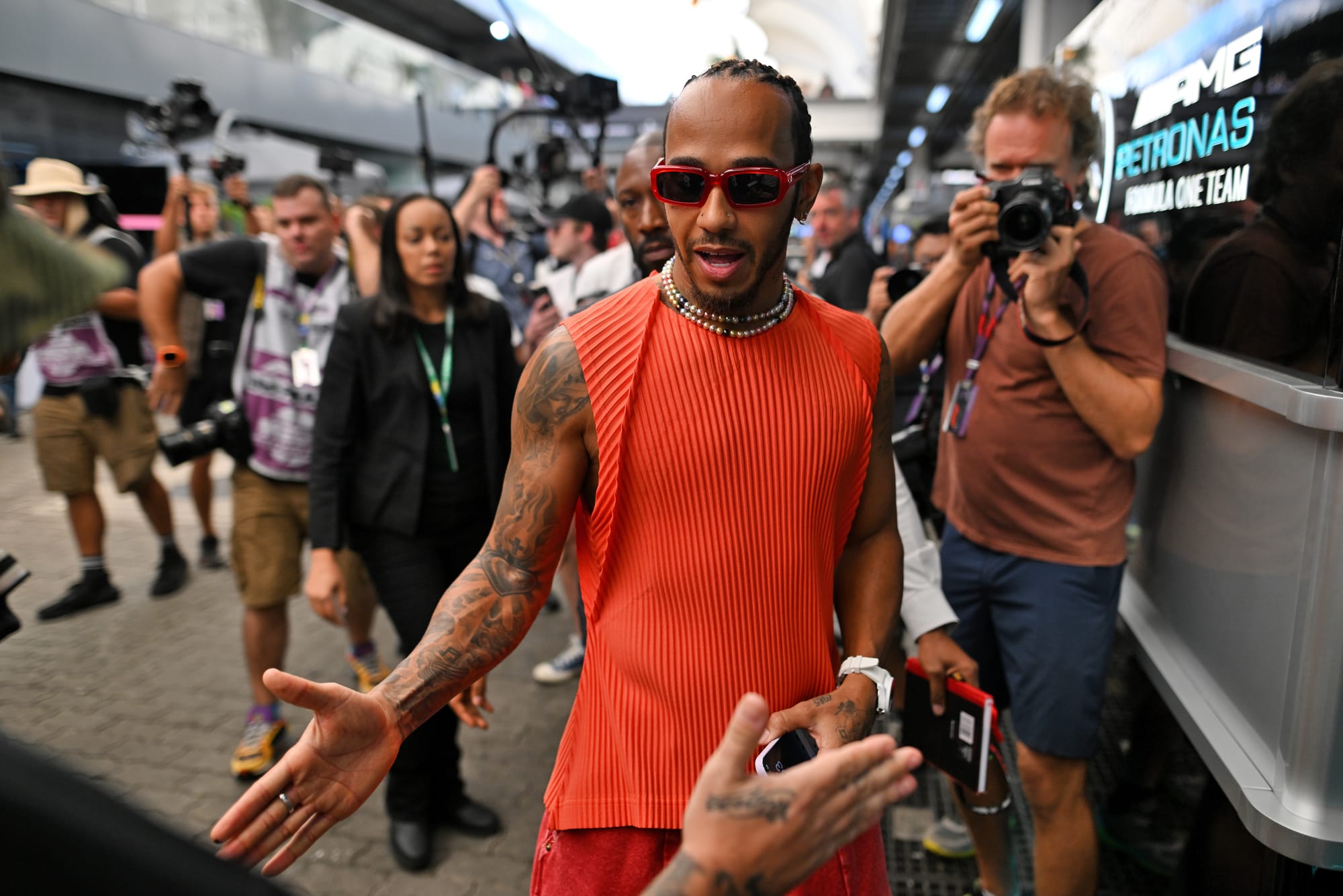
"That keeps me inspired but I definitely wasn’t thinking I’d still be racing [now]. You’re going to be stuck with me for a bit longer.
"But there may be moments when we come across a similar year to this year - next year there’ll be that down moment and I’ll be like, s**t I’m not going past 40.”
So could retirement come abruptly?
“I can’t say. I really have no idea. It could be abrupt and I just disappear from the face of the earth. It could be I move into a different role. I really have no idea.
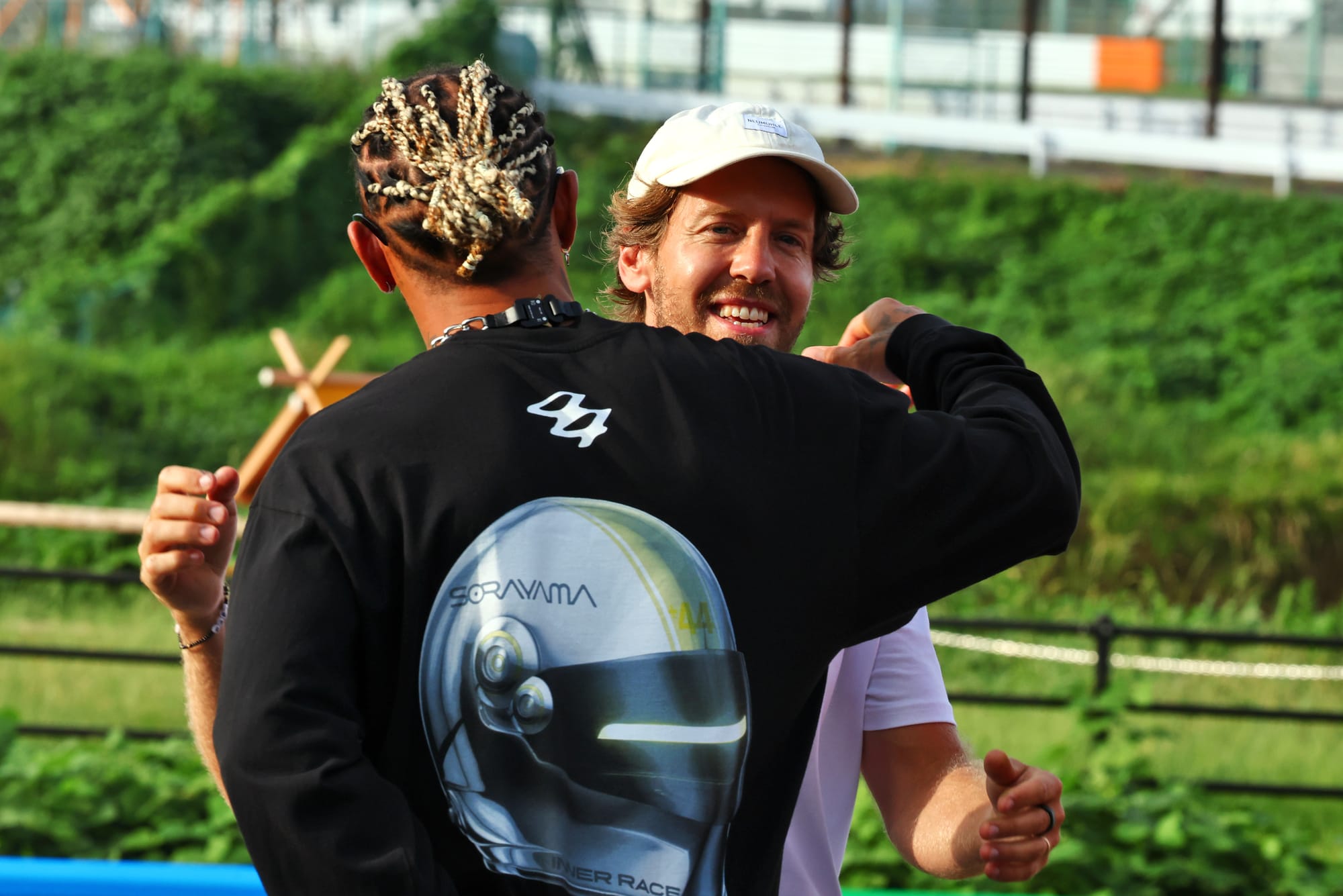
"I still love driving, I still love getting into the car. When they start the car up with all those people around you, the crew, you go down the pitlane, I still get this smile on my face the same as I did the first day I drove.
“If there is a day that doesn’t happen - and I hope that’s never the case - but then particularly then maybe I’ll know. But also there’ll be a point where I want to give my energy to something else or be in one place for a period of time.
"I don’t know how to do that at the moment.
"If I’m in a place for one week I get itchy feet and I’ve got to go somewhere else and maybe that will stick with me, who knows?”
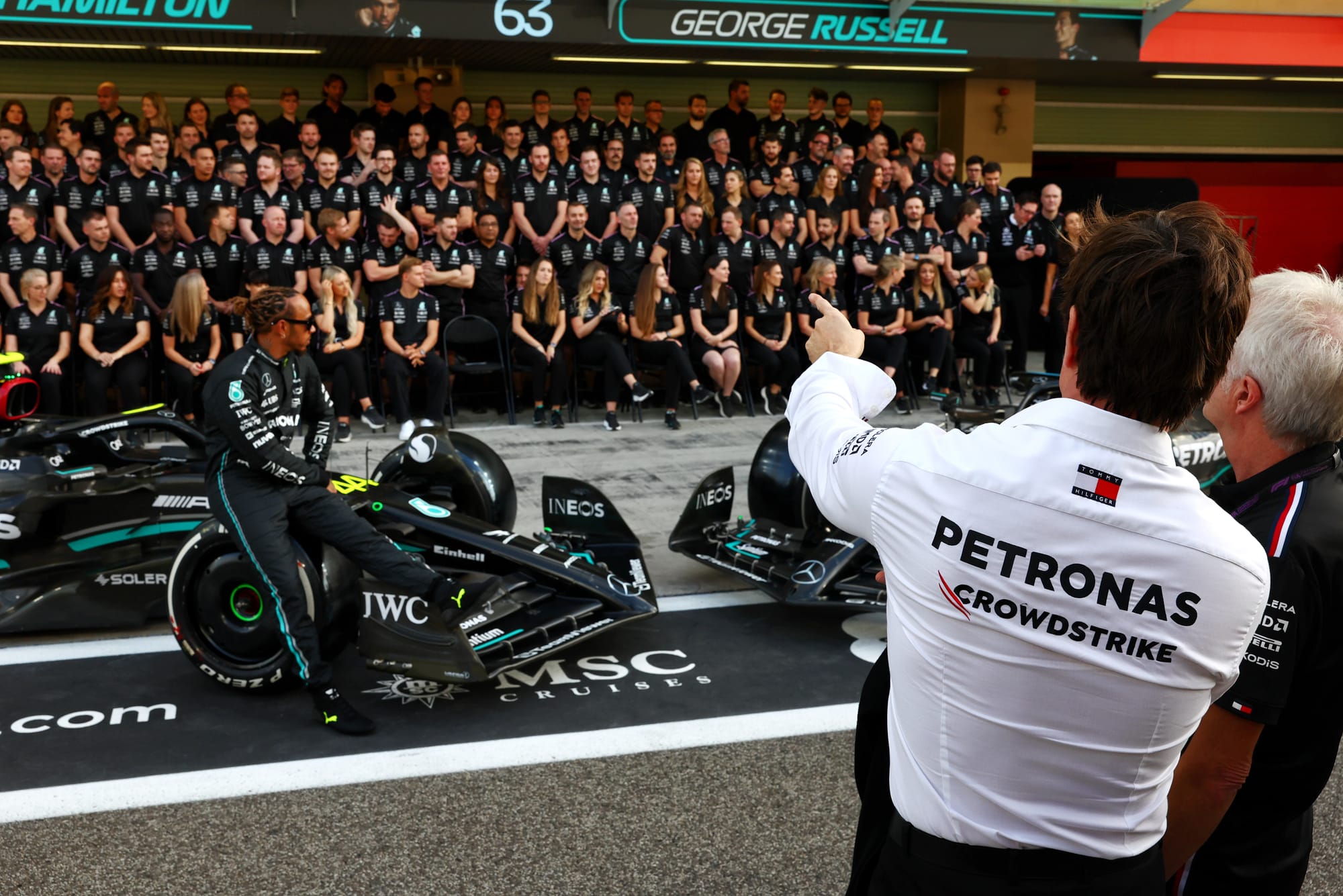
All of which puts even greater pressure on Mercedes to deliver a race-winning car before that day comes.
“There’s a huge amount of pressure on the team, for sure. Not just Toto but globally, all of us. Everyone back at the factory, a huge amount of pressure on them.
"Ultimately, as a boss like Toto you have to start leaning on people more rather than backing off on them and how you do that is not easy, as people break at a certain point.
"So how do you do it in a constructive way, in a way that’s inspiring them to continue?
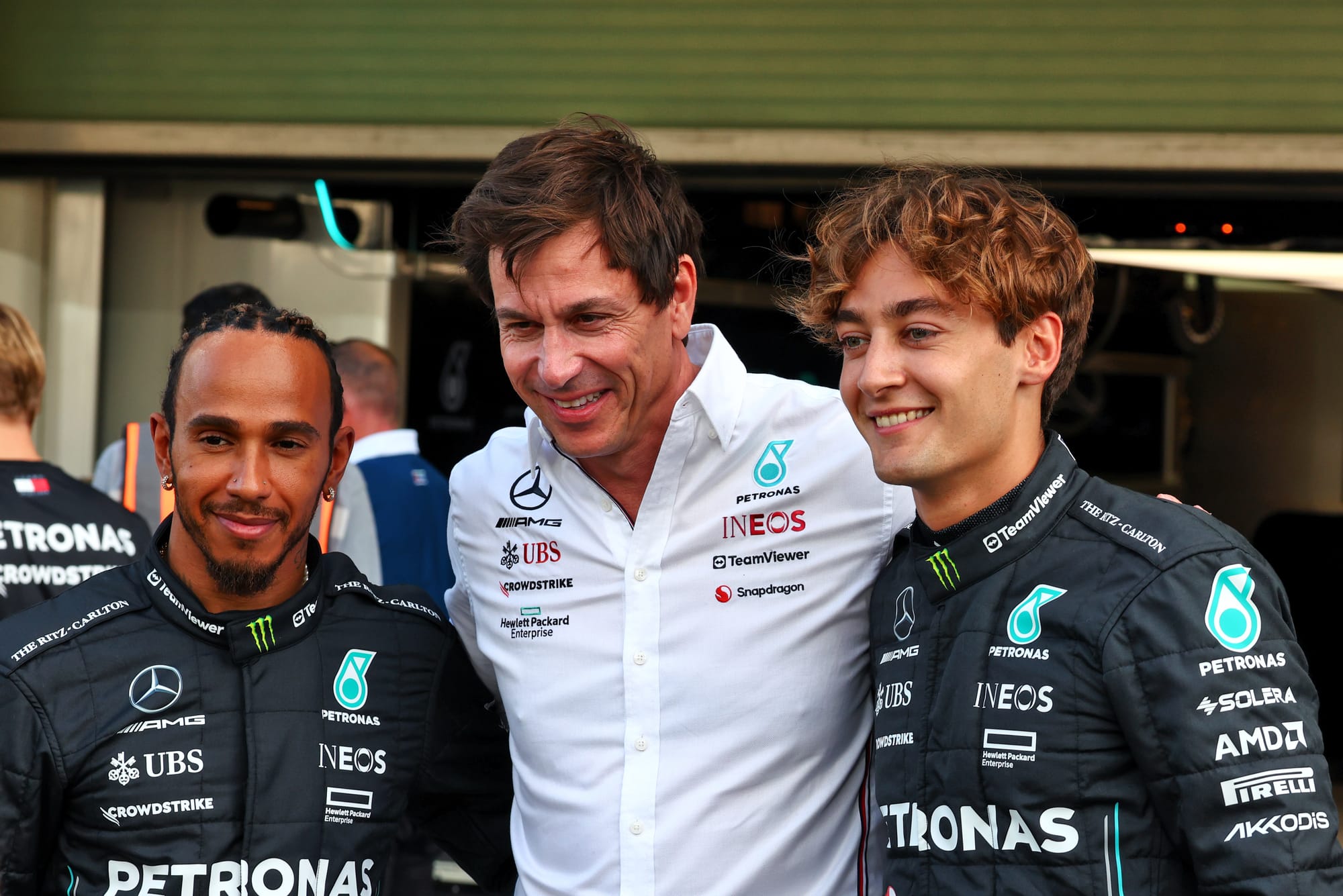
"For me, hopefully some of the race results and drives that I’ve been able to put in, I like to think that sparks inspiration for the guys, like 'oh, we’re almost there', and that trickles down through the whole system like, 'oh, he’s still got it, if we work hard and we give him the car he’s going to take us there'.
"That’s what I strive to be able to try to do.”
But keeping himself and all those around him buzzing with the energy needed to claw a team back to the front is surely draining.
“I just spent more time at the factory, having meetings with all of the key heads of the different departments and trying to keep them positive because if you imagine for them, no one feels great. And it can be demoralising.
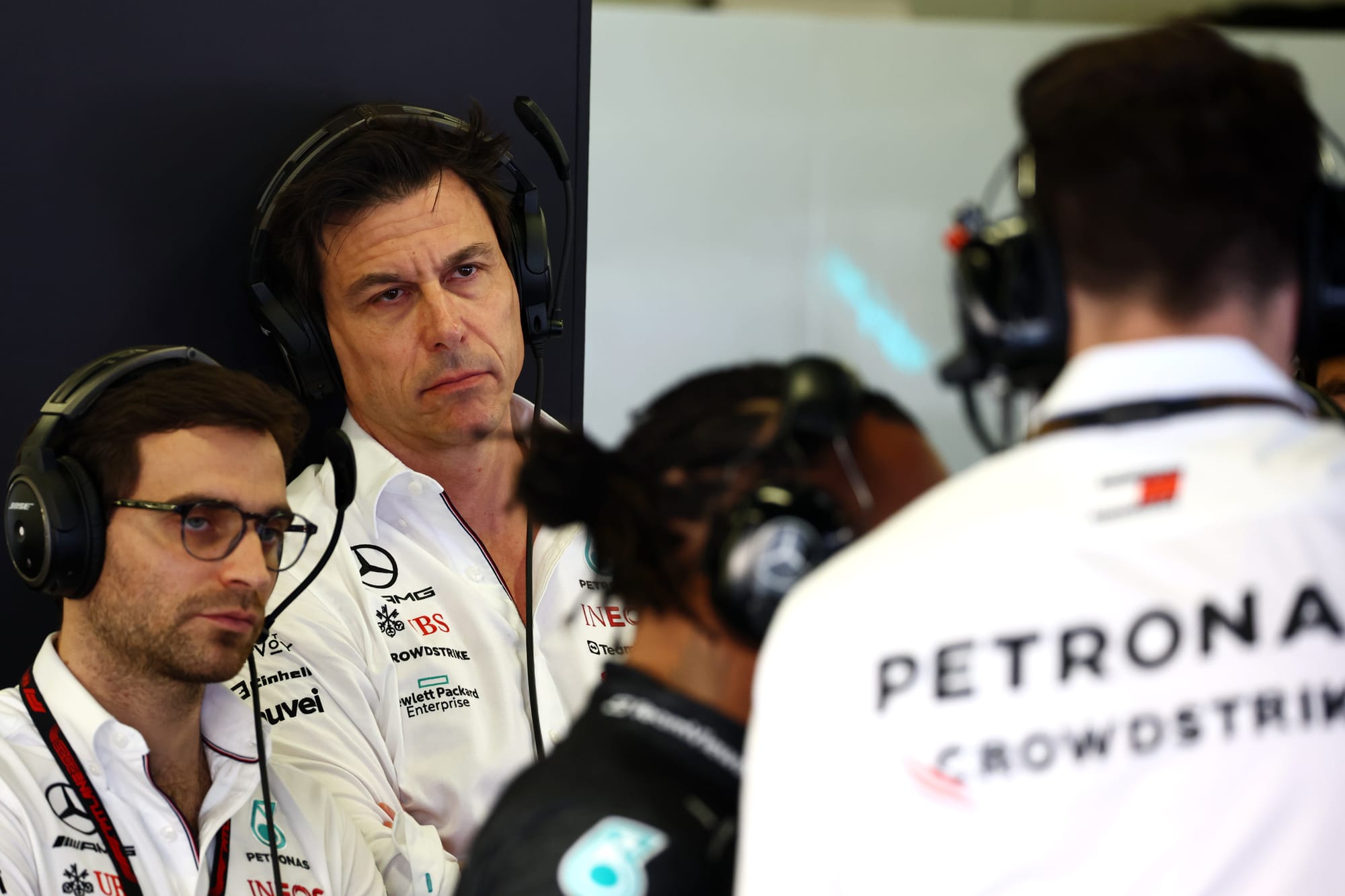
"So just really talking to them, saying, 'OK, we can do this, this is the area that we have a problem, this is what we've got to work towards'. And I would just help, try to be positive with them.
"I was looking at other cars, and I was asking just lots and lots of questions just to stimulate ideas. Ultimately just letting them do their jobs.
"We didn't have a North Star necessarily at the beginning of the year, knowing exactly where we need to work towards.
"It's been kind of a zigzag line trying to frickin' get to where we need to be. And every now and then something positive happens, you're like, 'OK, that's it'. And then it shifts, so the goalposts are always moving, which is typical.
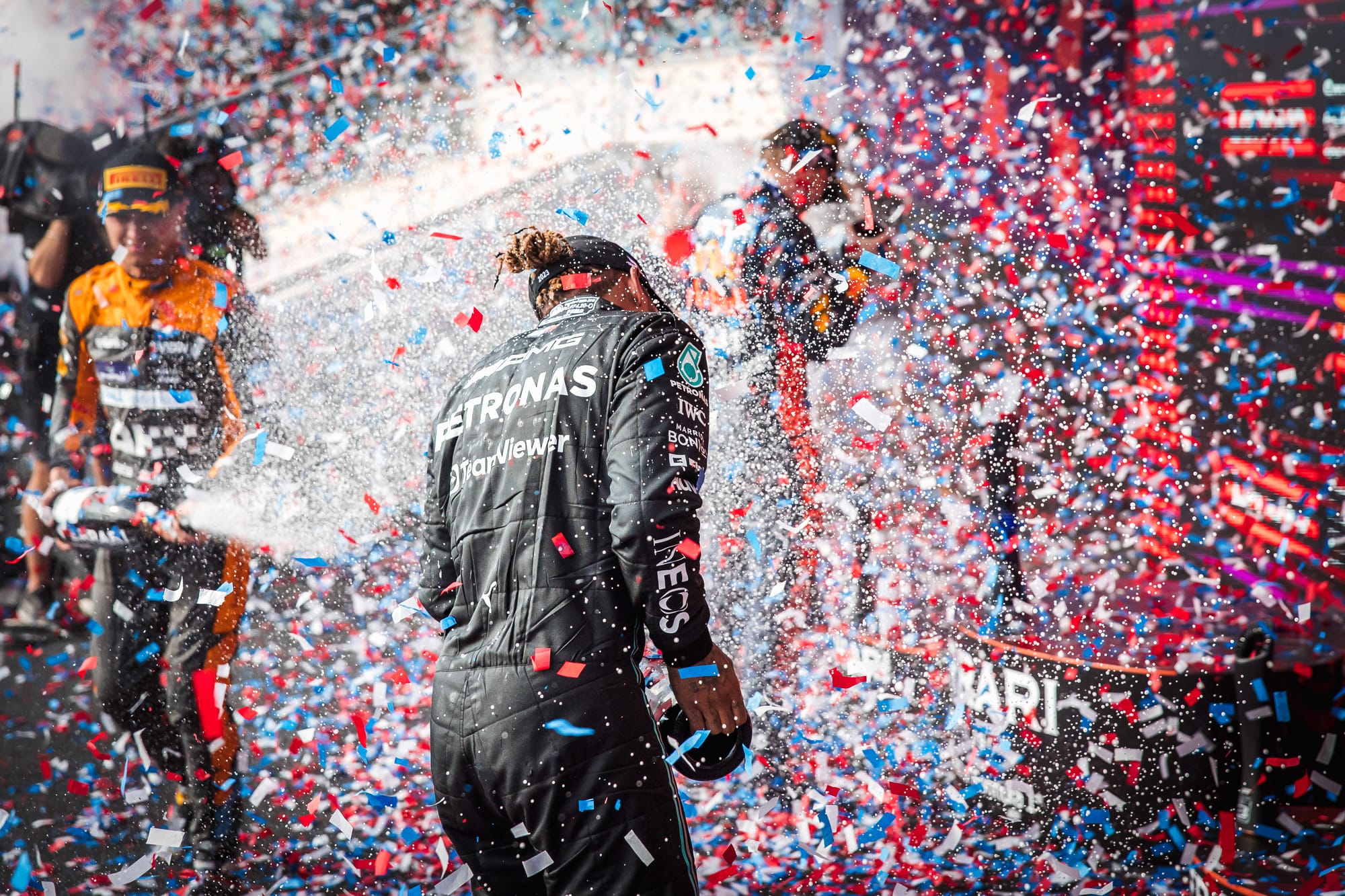
“There were certain things like, particularly [the] Austin upgrade where we had really positive steps. So there were bits of genius or excitement where like, 'OK, this is moving in the right direction and that keeps you going for another couple of months."
How long can he slog? How long before the lure of a different life beckons?
“Winning the world championship again is a huge part of the drive. Continuing to build with the team on the impact work we’re doing, continuing to push with the team with Mission 44.”
A roving ambassadorial role for F1 itself, while continuing his work on diversity, seems such a natural fit with his huge profile and his sensibilities.
Is this the future which is pulling at him?
“I don’t know how far that can go and I’m trying to expand it and that means I’ve got to raise more money. I need to build more of a team to do work in Brazil, for example.”
He’s recently been made an honorary citizen of the homeland of his boyhood hero Ayrton Senna and it’s not difficult to envisage him doing charitable work in a similar vein there.
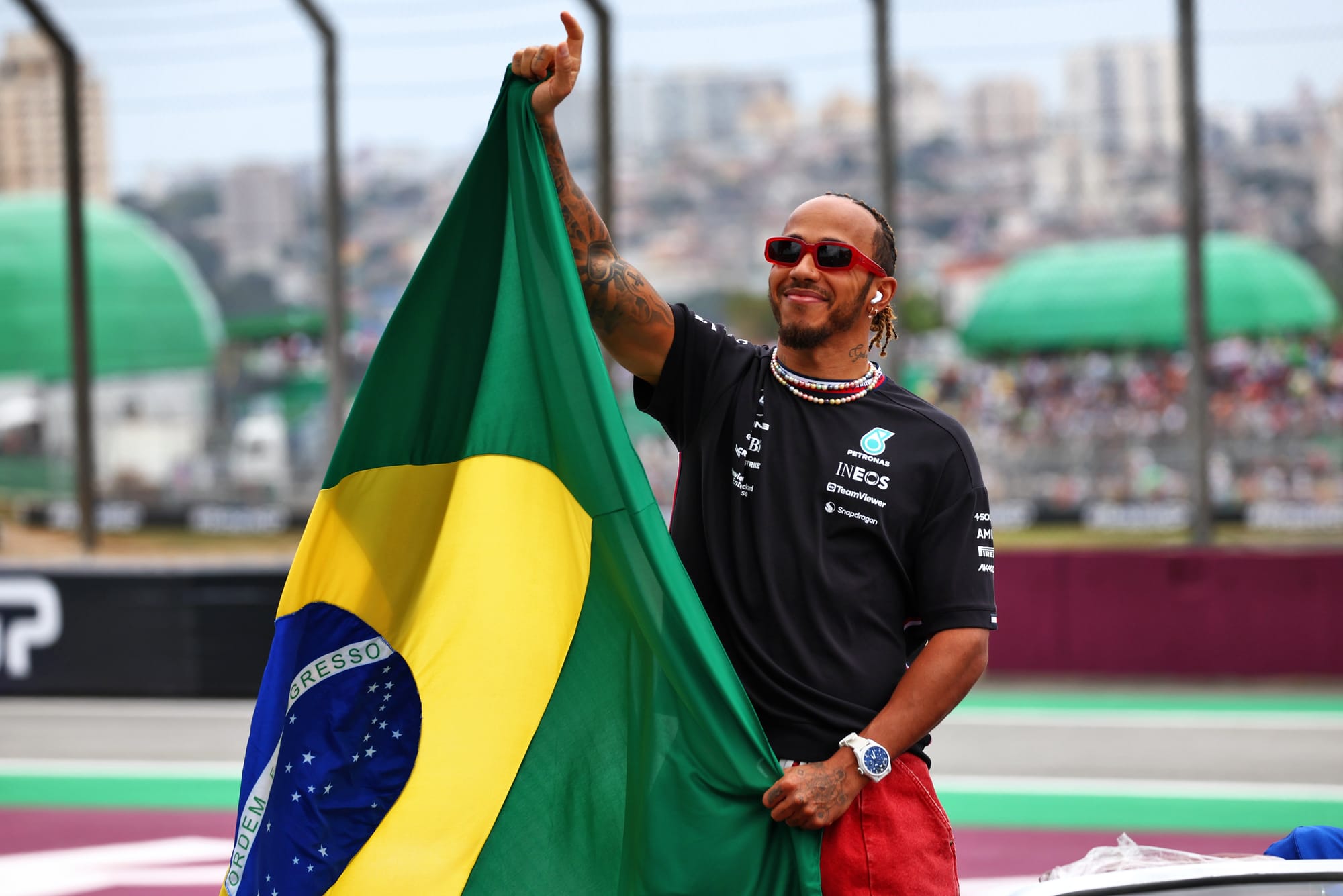
“Also [in trying to get] a grand prix in Africa which is a huge thing. I’m not necessarily involved with the track but I’m constantly speaking to Stefano [Domenicali], asking where are we at with this and just trying to be a good ally for Stefano because he’s got a great heart, has great intentions and a good vision, just trying to help him.”
Meanwhile, in his current role F1 demands full focus and is an insistent and relentless partner.
“I think I’ve learned a lot about my mind state and how to keep it in a solid place and stay positive, adding new tools into my armoury so I can continue to do what I do.
"I’m 38, nearly 39 years old and I feel great in my body. That’s due to certain tools I’ve been able to accumulate during these two years.

"Time that I’ve been able to manage outside racing think I’ve been able to do a much better job of maintaining energy and focus.
"I’ve got a better team around me than ever before.”
He is absolutely sincere in saying those things, just as he is sincere in discussing his struggles to stay positive.
Sometimes things can just go stale.
He batted away the Horner claims that he had reached out to Red Bull but just after this interview he was asked about just the idea of driving such a car, regardless of whether contact was made and by whom.
He replied: “Whilst every driver here would love to drive that car – and I’m not saying that I wouldn’t like to drive it and experience how that car is - we’ve had two really difficult years and if we work towards beating that car that’s going to be a way better feeling than just stepping into what is already the best car. That wouldn’t do much for me.”
We can only take him at his word on that. But perhaps there are some questions about himself even he doesn’t know the answers to yet.


